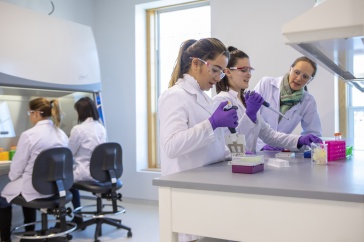
When you are in a room with people all passionate about the same thing, it’s energizing. That’s exactly what happened at the Code.org Regional Partner Summit in San Antonio in March. In our case, what we are passionate about is computer science education.
As the Code.org regional partner in New Hampshire, the University of New Hampshire STEM Teachers’ Collaborative and the STEM Discovery Lab at UNH Manchester work closely with Code.org to expand computer science (CS) education in the state by offering a professional learning program for teachers. There is strong momentum across the country and what motivates the 57 regional partners is simple: making sure students have access to opportunities in computer science.
Often, when people think about computer science, they automatically think coding. However, computer science is much more than that. It is about creating and not merely consuming. In a world increasingly concerned about excessive screen time, this is an important distinction. Computer science is about crafting and creating a computer game rather than just playing someone else’s. It’s about making an app to address an important issue. It’s a new way to demonstrate knowledge and to analyze and solve problems. It’s about managing data, thinking logically and understanding the impacts of technology and its responsible use.
Why is this important? In New Hampshire alone, there are over 1,400 open computing related jobs across many different fields, yet there were only approximately 400 computer science graduates last year. The majority of STEM jobs are in computing and computer science plays a role in nearly every sector of industry.
Similar to other regional partners across the country, New Hampshire has worked hard to address this, thanks largely to the work of the NH High Technology Council’s CS4NH advisory group. There has been bipartisan support in the New Hampshire Legislature to move forward with STEM and computer science education, along with work at the state level to develop and implement new policies, including new computer science educator certification and K-12 computer science standards.
But personal stories probably tell it best and there are no shortage of them among the Code.org regional partners. One partner shared a quote from a young woman living in a rural community who often felt “forgotten” and “left out” because of her location. That was before her school offered CS courses. Now she feels hopeful that she can pursue a career in cybersecurity and is excited by the prospect.
We have our own stories at the STEM Teachers’ Collaborative and the STEM Discovery Lab. Two stand out in Laura’s mind. One is a young man whose grades were all Cs or lower until he took a CS course. He excelled and went on to pursue a certificate that enabled him to find a job he loves. A female student designed her own app to show all the clothes, jewelry, and accessories in a closet and combine them in new ways without trying anything on. This ability to be creative allowed her to thrive and see the intersection between computer science and the fashion industry. In Emily’s case, it’s an English learner who was able to learn and demonstrate understanding of advanced math concepts through coding activities.
After the summit, we are even more energized to continue our work knowing we are among a network of partners across the country pursuing similar goals.



















































